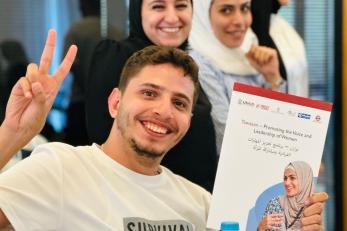Localization: Key to sustainability

In Jordan, Tawazon embarked on a mission to understand the barriers women often encounter in pursuing their passions and realizing their full potential. Recognizing the widespread challenges faced by women across the country, Tawazon delved into understanding the social norms and behaviors that limit women's opportunities.
Their journey began with a profound insight: mobility was a critical barrier holding women back. With this understanding, Tawazon conducted extensive research to uncover the factors driving change and identify key local actors who could support efforts to enhance women’s mobility.
Central to Tawazon's strategy was the principle of localization, engaging directly with local communities. Tawazon initiated dialogues and consultations to grab the specific needs and aspirations of each region. These interactions informed the development of tailored strategies for Jordan’s governorates, ensuring that their initiatives were not only relevant but also effective. Validation sessions became crucial, allowing Tawazon to fine-tune their strategies based on community feedback while ensuring they did no harm.
Building on insights from the Gender Equality and Social Inclusion (GESI) report, Tawazon organized 14 community consultations and youth dialogues across seven governorates, attended by nearly 600 men and women representing various segment of the local communities. Together, they prioritized initiatives to strengthen and promote women's economic, educational, and leadership opportunities.
Collaboration was key to Tawazon's success. They built strategic partnerships with influential stakeholders mainly the Jordan National Commission for Women (JNCW) and the Inter-Ministerial Committee (IMC) on Women’s Empowerment aligning local efforts with national strategies for women’s empowerment. This unified approach strengthened the implementation of sustainable behavior change strategies.
In addressing urgent challenges like Gender-Based Violence (GBV), Tawazon introduced the innovative "Train-to-Deliver" model. This initiative equipped local organizations with the tools and knowledge needed to implement effective behavior change interventions. Through structured training programs and expert guidance, Tawazon empowered these organizations to drive positive transformation within their own communities.
Throughout their journey, Tawazon emphasized the importance of community engagement. They understood that true progress stemmed from listening to community voices, valuing local wisdom, and integrating feedback into their plans. By nurturing these connections, Tawazon not only empowered communities but also laid a foundation for sustainable progress towards gender equality and holistic development in Jordan.